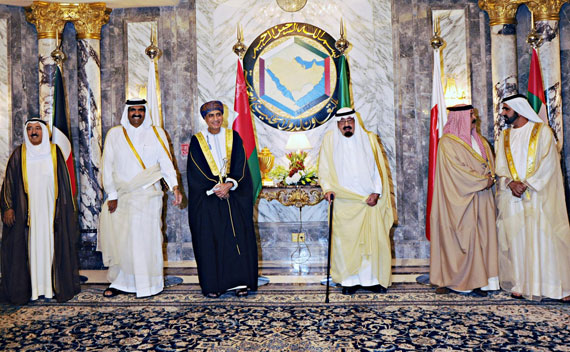The GCC: "Carefully Considered Reform" or Reactionary Politics?

Little-noticed news from the Gulf: the Gulf Cooperation Council may now expand to include Jordan and Morocco. The GCC consists of Saudi Arabia, Kuwait, Oman, UAE, Bahrain, and Qatar. Expansion to include Jordan and Morocco would transform its role from that of a regional group to a more ambitious association of monarchs who have several common interests.
The first is, of course, survival in a turbulent Middle East where worrying terms like “democracy” and “free elections” are being heard. The kings, amirs, sheiks, and sultans have a common interest in ensuring that Arab royalty stays on the throne. They are also all Sunnis, and share a dim view both of Iran and of what might be termed “the rise of Shia power” whether in Iraq, Bahrain, or where Shia constitute a significant minority group—as is the case in Saudi Arabia.
What is more, the article in the Abu Dhabi newspaper to which I linked above states:
“A larger coalition of Arab monarchies could also help to fill a power vacuum that has emerged in the region with the fall of Hosni Mubarak’s regime in Egypt and the current instability in Syria. The GCC’s recent leading role in the region is in contrast to the Arab League, the most high-profile regional organisation, which has shown signs of internal division and recently postponed a summit scheduled in Baghdad, apparently over differences on Bahrain.” A larger GCC, not bound to the Gulf, may indeed come to have a larger role.
But that reference to Bahrain points to a potential problem. For Jordan and Morocco, there may be an additional reward to joining the GCC: they receive aid from the oil producers in the Gulf, and may believe that they will get more if all these nations draw more closely together. But at what price? There are many rumors that the Saudis have counseled (i.e., pressured) the kings of Morocco and Jordan to abandon their announced reform plans, and stop any moves toward constitutional monarchy where the king would cede some powers to elected officials. The Saudi invasion of Bahrain is sometimes explained as an effort to prevent the Shia majority there from gaining political power, or to prevent an increase in Iranian influence, but this pressure on Jordan and Morocco—which are both Sunni and far from Iran—suggests there may be more here: a general desire to halt the rise of democracy in Arab lands.
The Arab world is experiencing a revolutionary moment, and this may lead monarchs to reject every proposal for reform. Henry Kissinger described the problem is his classic 1954 work about Europe after Napoleon, A World Restored: “ The conservative in a revolutionary period is always somewhat of an anomaly….What is the meaning of authority? What is the nature of freedom? Henceforth stability and reform, liberty and authority, come to appear as antithetical; the contest becomes doctrinal and the problem of change takes the form of an attack on the existing order, instead of a dispute over specific issues.” Arab kings must realize that reformers are not their enemies, and that true conservatives are also reformers. Kissinger continues: “To be a conservative, wrote Metternich, required neither return to a previous period, nor reaction, but carefully considered reform. True conservatism implied an active policy.”
An enlarged and well financed GCC can provide real leadership to the Arab world. The members are all countries with good relations with the United States, including in most cases close intelligence and military ties. The trick will be to prevent the GCC from becoming a reactionaries club, trying to avoid “carefully considered reform” and instead to preserve royal roles that make constitutional monarchy and democracy impossible. The legitimizing principle of government in the twenty-first century is popular sovereignty. The GCC monarchs can adjust to that, as many European monarchs did—or in the end disappear as did many other European kings and princes, ending up living in exile in rented mansions with plenty of time to contemplate what went wrong.
 Online Store
Online Store
